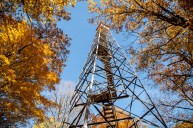A rock climber ended up stranding on Wyoming's Devils Tower National Monument after their 21-year-old partner plummeted to his death. The sad incident happened over the weekend.
Authorities later rescued the rock climber but could sadly do nothing for the 21-year-old who fell to his death. The incident happened on Sunday, Sept. 22 at 8 p.m. local time. First responders located the body of Stewart Phillip Porter, of Eau Claire, Wisconsin. His partner was stranded for 40 minutes.
Porter had been "rappelling the second pitch of El Cracko Diablo when he fell, sustaining major injuries." Authorities announced him dead at the scene. Rick Strasser, a ranger with the NPS, told the Casper Star-Tribune about the incident: "There wasn't any equipment malfunction whatsoever, but he was rappelling."
Devils Tower Deaths
Authorities chose not to identify the victim's partner. They later rescued them from the Tower's wall. In the past 100 years, there's only been seven deaths related to Devils Tower. Still, the National Park Service called Devils Tower dangerous. The Tower features hundreds of parallel cracks. This makes it perfect for crack climbing, but it has it's dangers. .
"The cracks vary in length and width: some are wide enough to fit your entire body, others barely have room for your fingers; the longest crack extends nearly 400 feet upwards," said the NPS.
Following the death of the mountain climber, the NPS offered some safety tips for the Tower. They mention checking the forecast in the area and wearing proper safety equipment. They said most deaths occur during the rappel at the tower. "The National Park Service does not maintain anchors — inspect all anchors and back them up if necessary," the agency said in its news release. "Ensure you know the location of your rappel route before you begin. Start rappels over the nose of columns to prevent ropes from jamming in cracks. Avoid knocking loose rock onto climbers below. Many rappels require two ropes; know the distance of your planned rappel before beginning."




